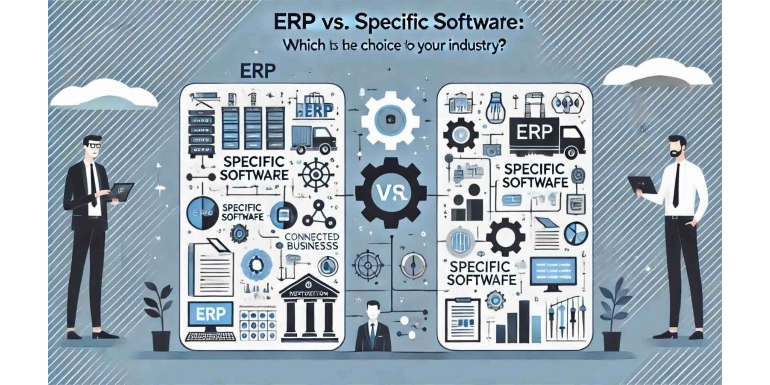
ERP vs. Specific Software: Which is the Best Choice for Your Industry?
In a world where technology plays a crucial role in business efficiency, the choice between an ERP (Enterprise Resource Planning) and specific software is a significant strategic decision. This choice can have a major impact on your company’s productivity, costs, and competitiveness. But how do you know which type of software is best suited to your industry? In this article, we explore the advantages and disadvantages of ERPs and specific software to help you make an informed decision.
What is an ERP?
An ERP is an integrated software solution that centralizes all the essential processes of a business within a single platform. This includes modules for accounting, human resources management, inventory management, production, sales, and more. The main goal of an ERP is to allow all business functions to share real-time information, thus improving efficiency and decision-making.
What is Specific Software?
Specific software is a solution designed to meet a particular need or function within a company. For example, a retail company may use inventory management software, while a service company may use project management software. These software solutions are typically highly specialized and offer in-depth features for a specific area.
Advantages of ERPs
1. Complete Integration
One of the biggest advantages of ERPs is their ability to integrate all business functions into a single platform. This allows for better communication between departments, reduces data duplication, and improves data consistency. For example, an ERP can link sales and accounting so that every sale is automatically recorded in the company’s financial records.
2. Global Visibility
ERPs offer a comprehensive, real-time view of all company operations. This enables business leaders to monitor company performance, quickly identify problems, and make data-driven decisions. For instance, an ERP dashboard can display sales, inventory, and financial performance in one place.
3. Scalability
ERPs are designed to grow with your business. As your company expands, you can add new modules or features to your ERP without needing to switch systems. This makes it a sustainable solution for growing businesses.
4. Compliance and Security
ERPs often come with advanced security features and are compliant with regulatory standards. For example, an ERP may include role-based access controls to ensure that only authorized personnel can access sensitive data. Additionally, ERPs facilitate compliance with local and international regulations, such as GDPR.
Disadvantages of ERPs
1. High Initial Cost
Implementing an ERP can be a significant investment, especially for small and medium-sized enterprises (SMEs). The initial cost includes purchasing licenses, installation, integration, and user training. However, these costs can be offset by long-term efficiency gains.
2. Implementation Complexity
ERPs are complex, and their implementation can take time. This requires careful planning, employee training, and effective change management. Additionally, it may be necessary to customize the ERP to meet the specific needs of the company, which can extend implementation timelines.
Advantages of Specific Software
1. Specialized Features
Specific software is designed to excel in a particular area. This means it offers in-depth and customized features for a specific industry sector. For example, project management software can provide advanced features for resource planning, task management, and team collaboration.
2. Lower Initial Cost
Specific software generally has a lower initial cost than ERPs. It is often easier to install and configure, making it attractive for small businesses or startups with specific needs but limited budgets.
3. Flexibility
Specific software is often more flexible in adapting to the particular needs of a company. Since it is designed for a specific function, it can be easily customized to meet the unique requirements of an industry sector.
Disadvantages of Specific Software
1. Lack of Integration
One of the main drawbacks of specific software is its lack of integration with other systems within the company. This can lead to information silos, where each department uses its own software without smooth communication between them. For example, inventory management software may not communicate effectively with accounting software, leading to data inconsistencies.
2. Scalability Challenges
Specific software may not be as scalable as ERPs. As your business grows, you may need multiple specific software solutions to manage different functions, which can increase complexity and costs.
3. Limited Maintenance and Support
Specific software may have limited support, especially if it is developed by smaller software vendors. This can lead to challenges in maintenance, updates, and problem resolution.
Which is the Best Choice for Your Industry?
The choice between an ERP and specific software depends on several factors, including the size of your company, your industry sector, your specific needs, and your budget. If your company needs an integrated solution that covers all business functions with a comprehensive overview, an ERP may be the best choice. However, if you have specific needs in a particular area and want a more affordable and simpler solution to implement, specific software may be more suitable.
Conclusion
The decision between an ERP and specific software is crucial to the success of your business. ERPs offer complete integration, global visibility, and scalability, but can be costly and complex to implement. On the other hand, specific software offers specialized features and flexibility at a lower cost but may lack integration and scalability. By carefully evaluating your needs and objectives, you can choose the solution that will bring the most value to your business.
